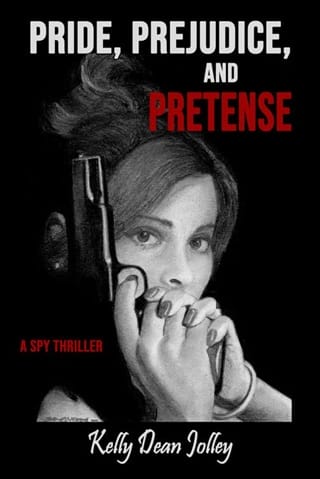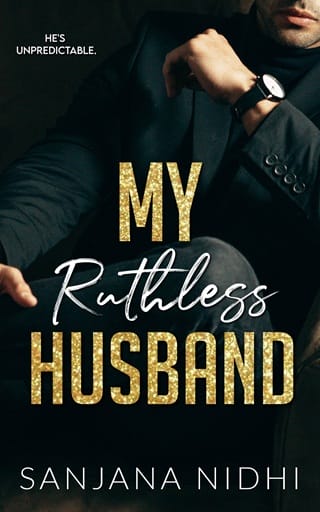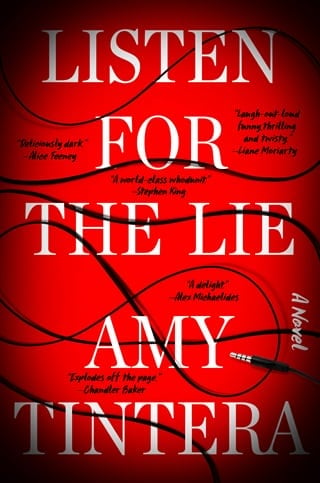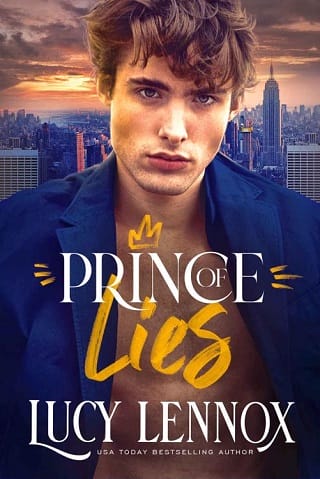Chapter Twenty-Six Backward and Forward
Days passed by as Lizzy ate, worked, and slept. Mostly, she slept, going to bed early and rising late, allowing herself to recompose and recoup. Her sleep was recreational; it re-created her. She felt stronger, more integral, more wholly herself. Agent Bennet began to fade—not just the internalized self-demand of missions, but also the battery of her habits.
In the mornings, after she finally left her bed, Lizzy seated herself by the large kitchen window and lounged. Cushioned there, she watched the brown, final leaves of autumn blow down, hot coffee cup in her hand, steam rising, thoughts wandering.
A squirrel outside kept her company, running back and forth along the top of the fence, atop Lizzy's morning horizon, in a frenzy of hoarding. Lizzy, however, was slowly divesting, letting go of all she had unknowingly been carrying. All the internal compromises of her Company life and all the guilt deserved and undeserved, she now refused to own.
Outside, the weather was cold and drizzly, the wind constant and biting, gusting off the Lake. It was a typical Rochester November: wet, windy, all-day permanent gray. It seemed like her hometown; it seemed equally strange and new to her. The sky was damp concrete, an endless cloudy expanse of shapeless brutalist architecture.
Eventually, her coffee done and the squirrel finished, Lizzy would stroll into her father's office wearing her pajamas and slippers, sit among his books at his desk in his chair, and work on the required essay for her application to graduate school. Her mother had left Mr. Bennet's office much as it had been the day he died. Working there now seemed like an act of acknowledgment, a late but necessary acceptance of the reality of his death. Her life with the Company had been her rejection of his death, her first falsity as an agent—it was a complicated knot she was still untying.
Lizzy had chosen to write about Le Carré, so she was slowly re-reading The Little Drummer Girl, taking notes and sketching interpretive arguments as she went. Another reason she was reading the book was as purgation, Purgatory. The book was therapeutic. Although the story forced Casper Mountain and Wickham back into her mind, reading it helped Lizzy find distance and perspective on all that—on Agent Bennet and her many missions before Wickham.
She felt both akin to and alienated from Charlie Ross, the actress at the center of the novel, the little drummer girl of the title. Charlie had declared herself “dead” when her mission ended. I'm dead, I'm dead. Lizzy felt Charlie's words and understood the abyss of self-contempt that they expressed. Fortunately, she had avoided sleeping with her mark, narrowly avoiding the action that “killed” Charlie.
Maybe there are unpardonable sins against yourself?
With Fitzwilliam’s help, Lizzy had not had to answer that question. She was happy to leave the question to Charlie Ross, although the answer Charlie gave, if any, was lost in the metaphysical silence and emptiness beyond Le Carré's final period, the end of the novel.
Lizzy stared at it when she finished her slow re-reading. That final period looked hauntingly like a bullet hole in the page. She looked up at the books, the empty study.
Fitzwilliam, where are you? Come to me!
Despite her gnawing anxiety about him, despite how much she missed him, she was otherwise well, otherwise improving. For the first time in years, she felt rested. She managed to keep peace with her mother even while sharing the same house. Best of all, she had a chance to re-establish real intimacy with the Gardiners, particularly Aunt Christine. Most afternoons, after writing, she drove her father's car and helped her aunt in the bridal shop.
It had not been necessary to say much to her mother about why she was home or about why she quit her job—Mrs. Bennet simply assumed that Lizzy had at last grown homesick for Rochester, the family home…and, of course, her mother. Although there was truth in the idea that Lizzy had been homesick, Aunt Christine believed there was far more to it than that.
Unlike Mrs. Bennet, who could never take a real sustained interest in anyone's life except her own, Mrs. Gardiner had noted Lizzy's travels over the years, noted what she said as well as what she didn’t say about her work. Most crucially, in the past she had observed Lizzy whenever they were together or talked on the phone, and she’d been especially observant since Lizzy had returned to her childhood home. She had graciously left her questions unasked, allowing her niece time to settle and adjust.
One slow afternoon in the shop, not long before Thanksgiving, she finally asked. "So, about your job…I've not protested about all the vagueness and evasion over the years, but you've said you're done with it. I will understand if you can't tell me much, but I have a guess. Have you been working for government intelligence, for the NSA or the CIA?"
Instead of answering, Lizzy just stared, and Aunt Christine chuckled. "If we were playing Battleship, I'd have just hit your carrier. That's how you used to look at me when we played." The two had enjoyed the game when Lizzy was a child. "Look, I apologize, but I opened that copy of Wives and Daughters after you put it down the day I brought it to you. I saw the inscription, the changes. Who's Fitzwilliam? Ned? Are you Fanny?"
Lizzy finally found her voice. "No! Well, yes…in a way. But I have to start at the beginning, I guess." She scanned the bridal shop. They were surrounded by white gowns but no customers now. She faced her aunt. "Yes. I worked for government intelligence, for the CIA. I joined—"
"Just after your father died," Aunt Christine said, completing the sentence.
Lizzy tilted her head. "How did you know that? I didn't say anything to anyone here until later, after the Farm."
"That's where you trained, right?"
"Yes, but I didn't say anything about a new job until I finished there. Did you already know?"
Her aunt shook her head. "No, but I knew something was wrong. You never really reacted to your father's death. You were sad and quiet…but no real grief. I was worried about you. You’d been moody that Thanksgiving when you came home. Then you came back and just sleepwalked through your dad’s funeral. When you went back to school, you cut off regular contact, and then you supposedly went to work at a camp during that summer. I knew something else was going on. I could tell that was a lie."
"Why didn't you talk to me at some point in all that?"
"I tried at the funeral, and I called you later at Haverford. But Lizzy, you were always vague, evasive."
The beginning of years of vague and evasive, Lizzy thought.
"I gave you space. I knew you, Lizzy. You're capable, smart, and strong. But your relationship with your father…"
This had been on Lizzy's mind too. "What about it?"
"When you were young, you were blind to your father’s faults. You worshiped him. Later, I believe you began to notice the faultlines in his character, but that never kept you from remaining worshipful toward him. It was a habit, automatic by that point, and I don't think you realized how ingrained it was.
“Then he died. And you seemed at loose ends, not in some minor way but…existentially. And then, all of a sudden, you weren't.
"You were gone that summer, and then you came back and said you had a government job in D.C. but told us nothing very definite about it. I eventually did the math—the secretiveness, the travel, the faint but noticeable scars. It was the change in you that really clued me in―your omnipresent tiredness, your shadowed eyes, and your new habits. You scanned every room for exits. There was the generalized suspicion, the taut, almost painful alertness. Maybe I've read too many novels and seen too much TV, but 'spy' was the word that came to mind, although it took me a long time to believe it. It seemed incongruous…until I realized it wasn't."
It took Lizzy a moment to process all of that. Once she did, she knew Aunt Christine was right about it. All of it. She had been so caught up inside the events and changes that she had not understood how any of it looked from the outside.
"What do you mean, until it wasn't?"
Her aunt pursed her lips, thinking. "I don't know how to explain it well, but there was something about your dad—his way of seeing the world." She gestured with her hands, indicating her struggle for words. Aunt Christine was an educated woman, verbal, and not often at a loss. "Thomas wanted to be and often was an ironist. But too often, he couldn't sustain the energy for that. When he couldn't, his irony collapsed into cynicism. It's a common spiritual digression, psychological digression. A pilgrim's regress." She shrugged at her phrase with a wan smile. "Something like that happened to you when he died, a regression…at least that's how it seemed to me. You've seemed quietly desperate since he died, lost in mute unhappiness you didn't, wouldn't fight. You just accepted it."
Lizzy saw herself then as she had not seen herself at the time. What was that line of Kierkegaard's that she had read in college, the one line that was common knowledge, fodder for countless memes? Life can only be understood backward, but it must be lived forward.
Since joining the Company, the way she had been living forward was not a way she wanted to understand backward. So she’d avoided it. She never allowed herself the time, space, and rest required for a meaningful backward glance. She had kept increasing her forward speed, kept her foot on the gas to prevent slowing, stopping, to prevent backward understanding.
Until the Wickham mission.
Until Fitzwilliam.
Until he somehow helped her re-establish a relationship, a conversation, with herself. By inspiring her to look backward, he had opened a new path forward. Forward and not backward.
Until love.
Love slowed her, stopped her. Fitzwilliam…and his talk about checkers. Lizzy had turned herself into a sacrificial piece for Kellynch, a means to his ends. A bureaucrat without a bureaucratic conscience.
Her aunt waited for her to speak. And so Lizzy did.
My beginning was an end. "My career in the Company started when I went back to Haverford after the funeral…"
She omitted classified details, but she related the story of Agent Bennet to her aunt all the way to Ned and Fanny, all the way to Casper Mountain, all the way to Wives and Daughters, to the lines through “Ned” and “Fanny” that had been replaced by “Fitzwilliam” and “Elizabeth.”
Sitting in the shop surrounded by wedding gowns, they cried together.
It had grown dark outside while the two talked. Closing time.
They closed the shop, and Lizzy drove home in the windy dark. When she parked at her house, she noticed a car roll by slowly and then speed up before it pulled into a driveway farther down the street. She noticed it but did not worry about it, done with the years-long daily burden of paranoia.
As she got out of her car, it started to snow. She pulled her coat close to her in the blowing flakes and walked inside.
***
Thursday, November 26
Thanksgiving came. Aunt Christine and Uncle Hubert hosted Lizzy and her mother at their house along with some of the Gardiners' neighbors. If Fitzwilliam had been there, it would have been perfect, but he wasn't. She’d hoped for a text or a call or something—but nothing.
That evening, she did get a phone call…not from Fitzwilliam, but from Charlie and Jane. They had visited some of Charlie’s D.C. friends for Thanksgiving and had secreted themselves in a room of the house to call Lizzy. Charlie was the one on the phone, although Jane had taken it from him for a moment to say hello and give Lizzy her love.
"Listen, Lizzy, we've got what I believe is the first reliable intel about Darcy." Charlie’s voice was nervous, and she braced herself. "There was a huge explosion at Vivos xPoint yesterday. Several men died—but Darcy wasn't among them.”
Lizzy legs had jellied until Charlie finished his sentence.
“One person was Bang Fumerton, the bomb maker. ‘Live by the sword, die by the sword.’"
"And…" Lizzy said, trying to get Charlie back on topic.
"And it's likely that Darcy was there. A witness described someone in the compound who matches his description. Remember? We thought there was a connection between Fumerton and Wickham."
"I remember. And they're sure Fitzwilliam wasn't…one of the victims?" Her future hinged on the answer.
"Yes, they're sure. We're still waiting on identifications, but I suspect they were all part of the Wicker Man. In all, eight men died. A mess."
"Keep me updated if you learn anything else, please."
"I will, Lizzy. I have a feeling we'll see him again soon…that you'll see him again soon."
The call ended. Lizzy's heart managed both to ache and to pound away at the same time.
***
Friday, November 27
The next day was Black Friday. Everyone, including Uncle Hubert, was at the bridal shop. They expected a big day, partly because Mrs. Bennet had insisted on extra advertising and an extra discount. They were running a White Christmas Sale on Black Friday— white for the gowns, of course. The irony made Lizzy chuckle, though it seemed mainly to annoy her aunt. Uncle Hubert had been posted at the register, leaving Lizzy, her mother, and Aunt Christine to roam among the gowns helping the crowd of customers.
The day was crazy, a blur of sweet brides-to-be and bloodthirsty bridezillas, a flurry of white dresses and shoes and veils. When it finally ended, they all sat together, exhausted, on couches outside the dressing rooms. Mrs. Bennet had produced an open bottle of scotch and poured a little into paper cups for everyone. She was immensely pleased with herself, with her White Christmas on Black Friday promotion. Smiling at them all, she was serene in her business acumen and happy with her scotch.
She gestured tiredly toward a rack of gowns. "Now, Lizzy, we just need to get you into one of these"―the same old refrain as usual. Aunt Christine looked at Lizzy with a smile of empathy and compassion, knowing how much she now needed that.
Lizzy shook her head and stared out the large front window. Black Friday had turned dark, and more snow was falling. A car pulled away from the curb. She wanted to see Fitzwilliam on the sidewalk, and the overwhelming intensity of her need for him made her expectant for a moment—as if her need could conjure him from the dark. But he did not appear.
She jumped when the buzzer sounded.
Her aunt stood. "That's the back door. Who'd be out there after we've closed?" She walked quickly toward the storeroom in the back.
"Oh!" Mrs. Bennet said, stopping her. "I know who it is. It's my priest, Father Gabriel. He asked to stop by. Something about paperwork he wants me to look at before tomorrow's meeting of the Christmas Toy Drive committee. Let me get it."
Aunt Christine sat back down, and Mrs. Bennet left to answer the door.
***
Lizzy had met Father Gabriel a few days before at the local Anglican church, The Good Shepherd. Her mother had gone in for a late-morning committee meeting, and Lizzy accompanied her.
When her mother went to the conference room at the front of the church, Lizzy had wandered through the sanctuary before finally sitting in a pew. The building was old, the dated design style of its worship space reflecting its age. Oak―heavy, dark, and impervious to time―covered the walls and supported the ceilings in thick beams. The burning candles near the altar reflected dully on the polished wood.
Church had never been a part of Lizzy's life, and she continued to be surprised that it had become so much a part of her mother's. She had been sitting, half-hypnotized by the candles and their moving images on the wall, when a voice spoke to her. "Are you Elizabeth Bennet?"
She had thought about the question for a moment, not hearing it simply as a first move in conversation but as a searching inquiry, a philosophical question. Turning, she found a squat, chubby priest standing behind her, his florid face almost glowing and his teeth as white as his collar.
"Yes, I am Elizabeth," she had reported to him thoughtfully, smiling as she spoke.
"I'm Father Gabriel, the priest here."
"Nice to meet you." Lizzy stood and faced him. "My mother's talked a lot about you. She's become very involved here."
He’d nodded. "Yes, she has. I'm not sure if she counts as…converted, but she's proven to be an enthusiastic committee member. She tells me you've moved back to town?"
"I have, or at least that's my plan. I'm hoping to start grad school at the University of Rochester in January, if they take me."
"Ah, yes. Beautiful campus! I rather love the church on the opposite side of the street from the main quad, the Interfaith Chapel. Or―as a friend of mine likes to refer to it―the Afterlife Sciences Building."
He’d smiled quickly with a soft laugh. "And that inscription on its front: 'Mine house shall be called an house of prayer for all people.' You have to love the antiquated language!" Lizzy knew the inscription; she had seen it numerous times before when she lived in the city. He went on, "Not a huge fan of ecumenism, I admit, and I'm not sure that 'for all people' is supposed to quite be understood in an interfaith way, but"―he shrugged his round shoulders―"live and let live. Eternally, one hopes. Are you interested in joining us here for worship?"
The word “worship” had struck Lizzy, especially after her conversation with her aunt. She smiled again. "Perhaps, but I'm not exactly churched."
His grin had flashed white again. "Well, Elizabeth, I'm not sure any of us are exactly churched, but we do our best."
"I plan to be here for Christmas," she had said. Her mother had already asked her, and Lizzy had agreed without much reluctance.
"Wonderful! That's the time to be here, to celebrate the birth of the resurrected one."
"But he wasn't resurrected until after he was born," she had said…and then felt silly for saying something so obvious to a priest.
He had given her a long look, not chiding but pointed. "He is always the resurrected one, Elizabeth. His resurrection reaches backward through time, not just forward. Into everyone's history, not just everyone's future. He is God incarnate, after all—not was."
***
Her memory was interrupted by her mother's voice from the back door of the shop. It sounded strange.
"Lizzy, can you come here?"
Everyone stood, looking at each other, and she hurried toward the back of the shop.
 Fullepub
Fullepub 



